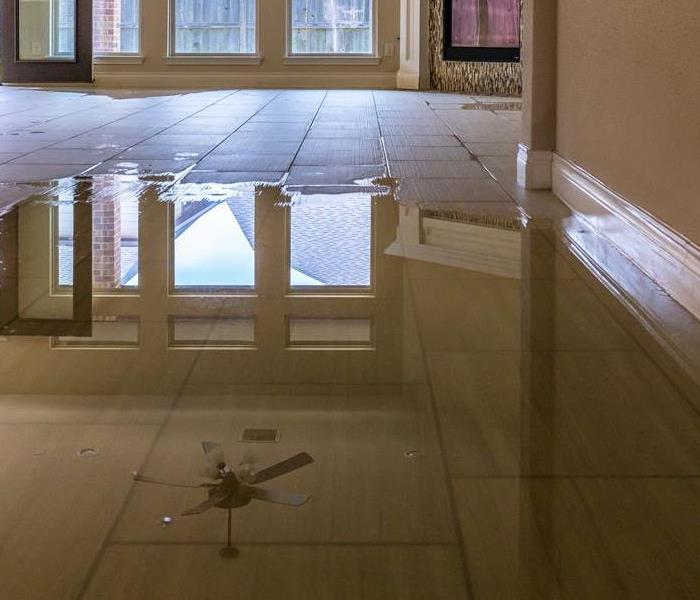The Top 10 Causes of Water Damage in Homes and How to Prevent Them
1/5/2024 (Permalink)
Did a pipe ever burst randomly and had your whole house flooded? Then you know the damage it can do to your home. Whether we talk about a leaking pipe, a poorly sealed window, or a natural disaster, understanding the potential causes of water damage is the first step towards protecting your home.
Here you have The Top 10 causes of water damage in homes and how to prevent them:
1. Leaking or Burst Pipes
Pipes can leak or burst due to age, freezing temperatures, or corrosion. This is one of the most common causes of water damage. Have a plumber inspect your plumbing every two years for leaks and fix any issues promptly. Consider insulating your pipes in colder climates to prevent freezing. Some houses had the insulation done during construction, while others didn’t, so it is best to inquire about what situation you are in.
2. Roof Leaks
A roof is not something you can forget about, as it gets damaged over time due to bad weather. Damaged or improperly maintained roofs can allow water to penetrate, causing leaks and potential structural damage. Regular roof inspections are critical for prevention.
What is more, different roof types have different life spans. For example, asphalt shingle roofs can last 15-20 years, while clay tiles last more than 50 years. Take this into consideration, as you might need to replace your roof shingles from time to time.
3. Faulty Appliances
Appliances like washing machines and dishwashers may malfunction and develop leaks, which might cause a fire in certain conditions. Regular maintenance, hose replacements, and timely repairs can prevent water and fire damage.
Some of the most common problems are:
- Washing machine: Leaking hoses, faulty water supply lines, malfunctioning pump;
- Dishwasher: Leaks in the dishwasher's hose, pump, or poor door seal;
- Water heater: Corrosion or a malfunctioning pressure relief valve;
- Refrigerator: The refrigerator's ice maker or water dispenser can develop leaks, and a clogged defrost drain may lead to water pooling in the fridge;
- HVAC System: Clogged condensate drain lines or a malfunctioning condensate pump can cause water to back up into the system and leak.
4. Clogged Gutters and Downspouts
Regularly cleaning the gutters and downspouts, especially during fall, should be enough to prevent water overflow. You can also install gutter guards to minimize debris accumulation.
5. Basement Flooding
Basements are the most prone to flooding, as they are the lowest level in your house. Many problems can cause a flood in your basement, some of which are:
- A pipe leak or hot-water tank failure;
- Drainage failure.
- A blocked or failed sanitary lateral;
Some measures you can take include:
- Include crystalline growth compound in the concrete pour of walls;
- Install dehumidifiers and special fans;
- Install window well covers;
- Regularly test your floor drain;
- Install a sump pump;
- Ensure proper grading around the foundation.
6. HVAC Issues
HVAC malfunction can lead to water leaks or condensation issues. Have your HVAC system serviced every six months to keep your air conditioner clean and functioning properly.
7. Poorly Sealed Windows and Doors
Drafts around the window, irregular temperatures, foggy windows, or difficulty in opening can mean your windows and doors are not tightly sealed, letting water and cold air pass through. This will cause mold to form around furniture and in other dark places.
You can seal drafty windows and doors with spray foam, weather-strip, or draft stoppers.
8. Foundation Cracks
Horizontal foundation cracks are a serious cause for concern, especially if accompanied by wall bowing. The most reliable and cost-effective method to repair the foundation crack is by sealing it up with epoxy and polyurethane crack injections. Remember to have it done by a professional.
9. Overflowing Bathtubs or Sinks
Forgetting to turn off the tap while filling a bathtub or sink, as well as clogged pipes, can lead to overflow. Avoid leaving running water unattended for too long to prevent overflow. Also, clean the curved pipe under the sink, called the P-Trap, every one to three months to avoid clogging.
10. Natural Disasters
Events such as floods, earthquakes, or hurricanes can cause severe water damage. While prevention is limited, investing in insurance and taking precautions can minimize damage.
Elevate utilities in flood-prone areas and reinforce your home against earthquakes if you live in a seismic zone. Any other prevention method described can help you prevent damage in case of a natural disaster.
It's crucial to act quickly if you notice any signs of water damage. Prompt attention can help minimize the damage and prevent long-term issues such as mold growth. If damage has already been done, call SERVPRO of Phoenix at (480) 503-2090 and have a team of qualified technicians properly clean and restore your house so that it feels like home again.






 24/7 Emergency Service
24/7 Emergency Service